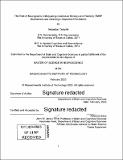The role of neurogranin in modulating contextual memory and plasticity : FMRP involvement and adrenergic-dependent facilitation
Author(s)
Templet, Sebastian (Sebastian Boyd)
Download1281177189-MIT.pdf (12.87Mb)
Other Contributors
Massachusetts Institute of Technology. Department of Brain and Cognitive Sciences.
Advisor
Rebecca Saxe.
Terms of use
Metadata
Show full item recordAbstract
Activity-dependent changes in neuronal properties (neuronal plasticity) are critical for information processing and storage in the brain. It is well-established that protein synthesis is essential for both memory formation and the long-lasting changes in synaptic strength that accompany learning. However, it's still unclear when protein synthesis needs to occur relative to the experience to form durable memories, and the identities and roles of crucial proteins in these processes have not been elucidated. Neurogranin, a small protein that regulates calcium-dependent signaling, is poised to modulate both memory and synaptic plasticity. This thesis aims to provide insights into the molecular underpinnings mediating context memory formation in the hippocampus. By combining molecular, behavioral, pharmacological, and viral manipulations, we assessed the role of neurogranin in hippocampal memory formation and synaptic plasticity. We observed a rapid, activity-dependent upregulation of neurogranin mediated by FMRP. Neurogranin was found to be regulated by the adrenergic system, and our data suggested a role in the adrenergic-mediated enhancement in memory formation and a form of synaptic plasticity known as long-term potentiation. These findings strongly suggest that neurogranin plays an important role in regulating memory and synaptic plasticity.
Description
Thesis: S.M. in Neuroscience, Massachusetts Institute of Technology, Department of Brain and Cognitive Sciences, February, 2020 Manuscript. Includes bibliographical references (pages 49-57).
Date issued
2020Department
Massachusetts Institute of Technology. Department of Brain and Cognitive SciencesPublisher
Massachusetts Institute of Technology
Keywords
Brain and Cognitive Sciences.